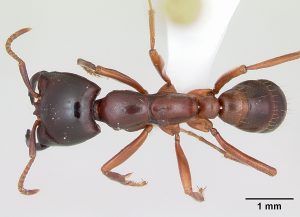A group of insectologists is receiving praise on social media for retracting a 2022 paper in which they claimed, erroneously, it turns out, to have discovered a novel ant fossil.
The paper, “An Eocene army ant,” appeared in November in Biology Letters, a Royal Society title. The authors were led by Christine Sosiak, of the New Jersey Institute of Technology, in Newark. The paper has yet to be cited, according to Clarivate Analytics’ Web of Science.
According to Sosiak and her colleagues:
Here we report the oldest army ant fossil and the first from the Eastern Hemisphere (EH), Dissimulodorylus perseus, preserved in Baltic amber dated to the Eocene. Using a combined morphological and molecular ultra conserved elements dataset spanning doryline lineages, we find that D. perseus is nested among extant EH army ants with affinities to Dorylus. Army ants are characterized by limited extant diversification throughout most of the Cenozoic; the discovery of D. perseus suggests an unexpected diversity of now-extinct army ant lineages in the Cenozoic, some of which were present in Continental Europe.
But not long after the paper appeared, other ant experts informed the researchers that their ant advance was not an emissary from the Eocene Epoch after all.
According to the retraction notice:
Shortly after the publication of this report the authors were contacted independently by two researchers (Brendon E. Boudinot, The University of Jena and Dmitry A. Dubovikoff, St Petersburg State University). Both researchers indicated that they were aware of several specimens of Dorylus preserved in sub-fossil resin (copal), within historical collections of Baltic amber from 1920 to 1930s—the same time frame associated with the Museum of Comparative Zoology (MCZ) specimen reported in Sosiak et al. [1]. Copal in both cases were either initially misidentified or mixed among pieces of authentic Baltic amber. The collection at the University of Jena comprised both Baltic amber and copal mixed and without labels; those copal specimens were identified via FTIR analysis this year. At least one of the Jena copal specimens, although not a Dorylus army ant specimen, was prepared in the same manner as the MCZ specimen we reported here: trimmed and mounted directly to a microscope slide. The traditional practice of slide mounting Baltic amber with inclusions contributed to our confidence regarding the provenance of the MCZ specimen. Slide mounting was a common practice in the nineteenth and early twentieth century among Baltic amber researchers [2].
Sosiak and her colleagues explain that:
While we recovered a characteristic signature of Baltic amber in all spectra from both raw and prepared Baltic amber references (the ‘Baltic shoulder’ between 1175 and 1250 cm−1 [4]), we did not recover the ‘shoulder’ in the MCZ specimen or in any of the copal specimens (figure 1). The exact provenance of this specimen will require additional investigation; however, we feel confident in stating that the MCZ holotype is not Baltic amber and is likely a sub-fossil resin. Because the age and locality of Baltic amber is central to the conclusions made in our report, we wish to retract our publication.
The authors end with an apology, and a warning of sorts to others in the field:
While museum labels remain the most common manner in which specimen provenance is established, we should have exhibited more caution regarding specimen provenance and deeply regret this error.
Announcing the retraction on Twitter, Sosiak called the move “sad but necessary”:
Other researchers – including Kate Laskowski, whose own openness about a flawed study earned plaudits among her colleagues – praised the transparency.
Kevin Wolbach, an aquatic ecologist in Philadelphia, tweeted:
Like Retraction Watch? You can make a tax-deductible contribution to support our work, follow us on Twitter, like us on Facebook, add us to your RSS reader, or subscribe to our daily digest. If you find a retraction that’s not in our database, you can let us know here. For comments or feedback, email us at [email protected].

Thesis, meet antithesis.
The original paper is behind a paywall, but the retraction is freely available.